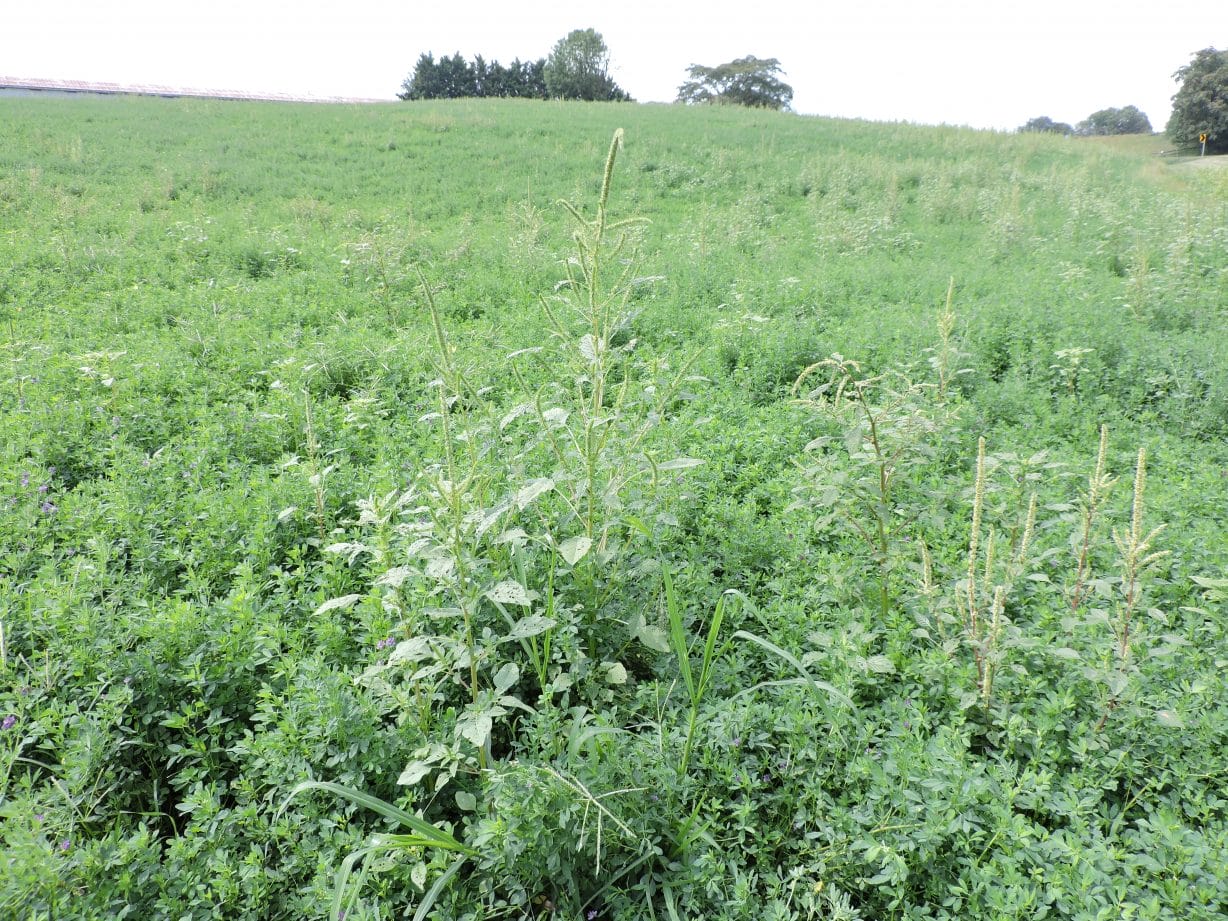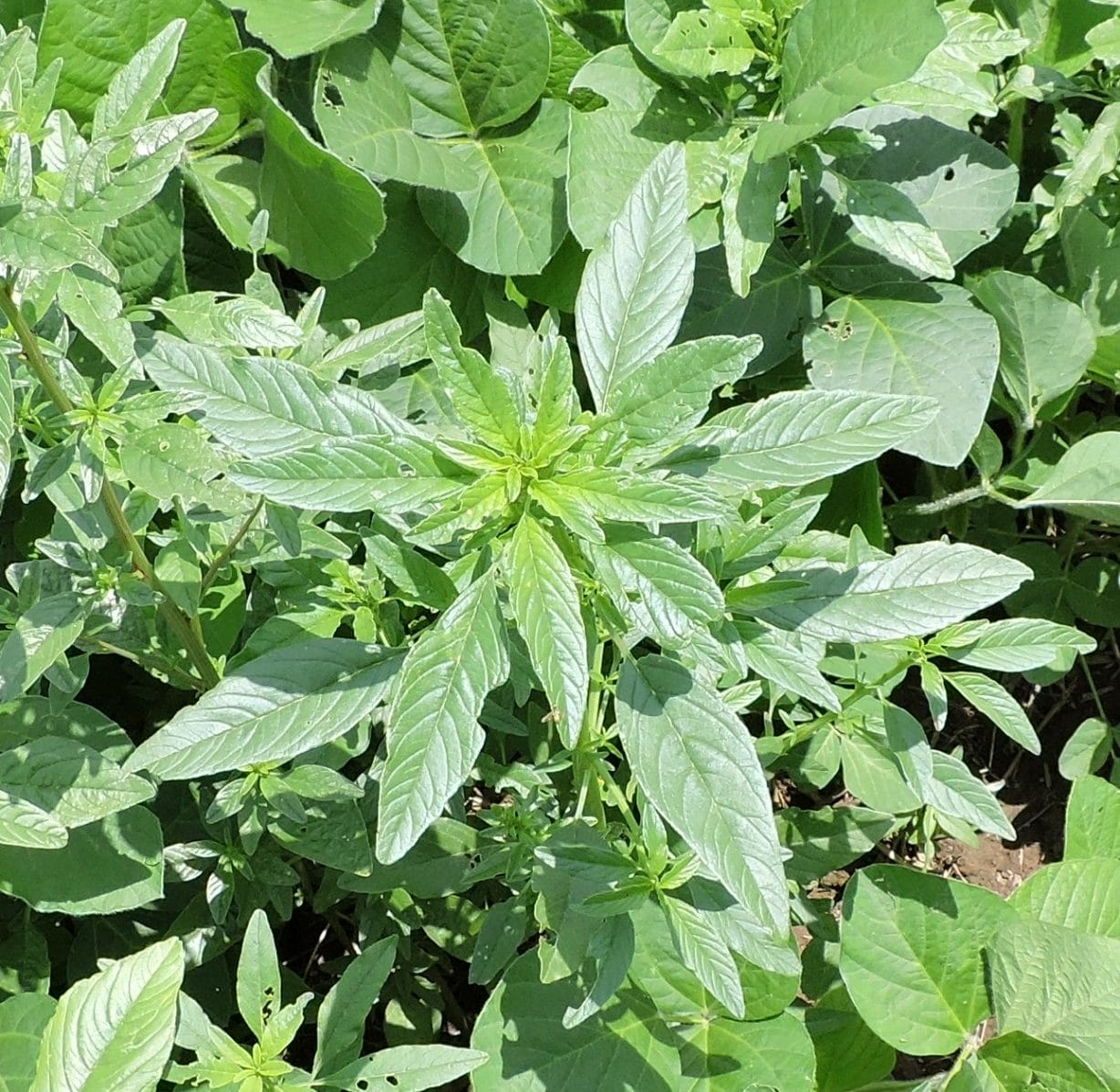
By Andrew Jenner, publisher
Press releases from Virginia Cooperative Extension aren’t typically a place to find dramatic language, but then again, the two new plants that showed up in several fields this summer aren’t your typical weeds.
“The dreaded palmer amaranth and waterhemp have made their way into Rockingham County,” wrote Doug Horn, a crops and soils specialist based at the extension office in Harrisonburg, in a September news release.
Drought-tolerant, extremely fast-growing and quite large – individual plants can easily reach 10 feet – regular old Palmer amaranth would be an impressive weed in its own right. What’s earns the modern-day version this “dreaded” label from the extension service, however, is the fact that it’s developed resistance to multiple herbicides, including glyphosate (the active ingredient in Roundup). To top it off, individual plants can produce hundreds of thousands of seeds.
“In the Midwest, some Palmer amaranth has become resistant to five different categories of herbicides,” Horn told The Citizen.
Unchecked, palmer amaranth and waterhemp – both members of the pigweed family – can outcompete other plants and cause extreme yield loss to important crops like corn and soybeans.

Glyphosate-resistant palmer amaranth was first recorded in Georgia in 2004. The next year, the same trait was confirmed in waterhemp in Missouri. The phenomenon gradually spread, with resistant Palmer amaranth showing up in southeastern Virginia within the last decade, Horn said. For the past five years or so, he continued, Horn and his colleagues in the Valley have been on high alert.
Then, in 2017, a pesticide-resistant Palmer amaranth plant popped up in an Augusta County soybean field. It is thought to have arrived by the most common vector for the weeds’ march across the country: farm equipment that transports stowaway seeds from one field to the next.
In Augusta County, Horn said, it was a second-hand combine purchased in North Carolina and used to harvest a wheat field that brought the plant to the Valley.
For a time, Horn and colleagues thought they’d contained the Augusta County incident. But then, earlier this summer, Horn positively identified Palmer amaranth in two separate fields and waterhemp in a third – the first documented cases of either in Rockingham County.
“It was very concerning when I first heard it was confirmed in Rockingham County,” said Jeff Phillips, manager at S.L Hess & Sons, a seed, fertilizer and herbicide supplier in Harrisonburg. “Our conventional herbicide programs won’t control these weeds.”
On the bright side, local farmers aren’t completely inexperienced in battling herbicide-resistant weeds. Within the past several years, a glyphosate-resistant strain of marestail has been present in Rockingham County.
“We’re learning how to manage that,” Hess said.
That, however, is made easier by the fact that marestail hasn’t developed resistance to as many herbicides as have Palmer amaranth or waterhemp – and isn’t quite as troublesome as a weed to begin with.
Horn said the growing set of challenges herbicide resistance is posing to local agriculture means it’s time to bring back old-school weed-control practices like regular field scouting and crop rotation that modern seed technology (e.g. Roundup Ready soybeans) once made seem obsolete.
“Glyphosate made weed control so easy for so long,” Horn said.
Phillips points out that one herbicide, dicamba, is effective at controlling Palmer amaranth and waterhemp in the region, and that dicamba-tolerant seed and the herbicide itself are widely available in the area. (Dicamba presents challenges of its own, and has been earning bad press recently for its tendency to volatilize and damage nearby vegetation that was not supposed to be treated.)
“It’s just a matter of being aware of what’s in the fields and getting the proper chemistry on them,” Phillips said, of the strategy going forward for dealing with the county’s unwelcome new plants. “People are concerned, but we’re working through this.”
Don’t put it past the superweeds to up the ante once again, however. Dicamba-resistant waterhemp turned up a year ago in Missouri, and earlier this year, scientists in Kansas confirmed dicamba resistance in Palmer amaranth.
Journalism is changing, and that’s why The Citizen is here. We’re independent. We’re local. We pay our contributors, and the money you give goes directly to the reporting. No overhead. No printing costs. Just facts, stories and context. Thanks for your support.














